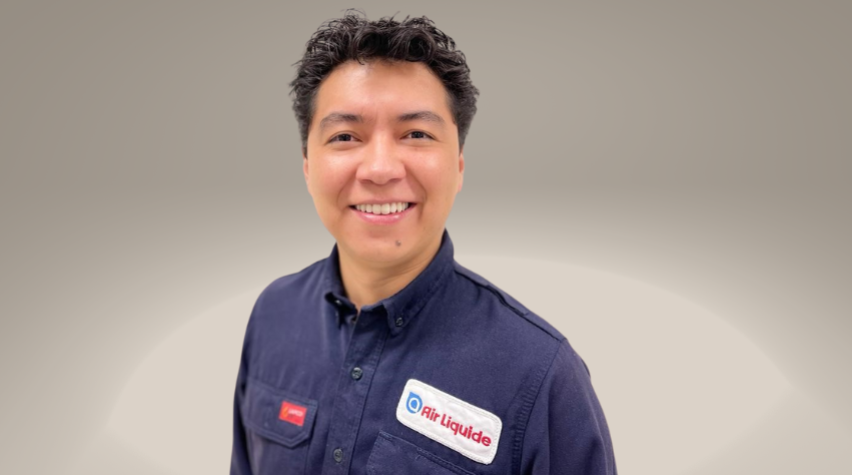
Welcome to the latest in a series of AIChE blog posts profiling process engineers, a diverse group of professionals spanning multiple industries and regions. In this series, we profile process engineers who work in a wide range of fields, including petrochemicals, pharma, bulk chemicals, food, and other process-intensive industries.
Are you a member and process engineer interested in being profiled? We’d love to hear from you via this volunteer opportunity. Please also check out our online discussion group specifically for process engineers. You can find out about these initiatives and join our efforts by visiting aiche.org/process-engineers.
This month, we introduce you to David Cruz Zamora, Process Engineer at Air Liquide. He discusses the path that led to his career in process engineering, overcoming challenges, and the importance of his work.
Tell us a bit about your work as a process engineer.
I started my career in chemical treatments at Nalco where I was introduced to the oil and gas industry. At Nalco, I also was given the important opportunity to develop leadership and communication skills which helped me engage with customers and build a solid relationships with them. I also learned how to be a good leader, and how to effectively work in a team.
Eight years later, I am responsible for designing, implementing, controlling and optimizing the production process in a safe, efficient, and cost-effective manner. I oversee the entire production process, from brainstorming and designing new systems, to troubleshooting and optimizing existing ones. I often collaborate with other professionals such as mechanical, electrical, and instrument specialists to carry out projects and to help them meet their goals.
I had the opportunity to become part of the Air Liquide team, where my previous expertise in the field played an important role in optimizing reaction sections and evaluating asset performance for process optimization.
As a result, I learned that a basic understanding of chemical engineering is fundamental to understanding the whole process and to ensuring that the process runs smoothly while meeting quality standards.
Why did you become a process engineer?
As a kid, I used to create devices with simple motors, LEDs, and batteries, and I used domestic chemicals such as vinegar and soda to create rockets. I am quite sure that many process engineers can understand the desire to imagine, design, and create things.
That’s why I decided to pursue a role where the challenges were constant and where my technical skills were tested to the maximum while working in a team environment. This role has allowed me to collaborate on all specialties within the plant, to work with overseas sites to benchmark our practices and process, and exchange knowledge. Pushing the boundaries of what a team can do is what I enjoy most.

What were some of the biggest challenges you faced in your role as a process engineer?
After spending eight years developing soft skills and gaining experience in the oil and gas industry with the country’s most challenging customer, I had to open my textbooks and notebooks again. Preserving my notebooks from my university was one of the smartest decisions I ever made.
There are many challenges in basic chemistry, thermodynamics, reactors, and mass and energy transfer that need to be applied to everyday situations. On the other hand, these tools are just the basics. Data management and digitalization are the key factors when it comes to managing a business.
How is your work as a process engineer critical to your particular job assignment or industry?
The role of process engineer is extremely important. As a process engineer, I have a big responsibility to the plant management as they rely on my expertise as well as on my analytical and problem-solving skills. However, I have to say that the most critical component is encouraging the team to think about physical or chemical phenomena in simple terms and forget how complex some of these phenomena may be. I consider this to be the most important aspect of my role because the team members are responsible for operating the plant and oversee asset operations.
What do you think was most important about what you did as a process engineer?
There are many issues that a process engineer can help solve and there are also a lot of basic duties that process engineers perform. Some of these duties include mass and energy balances, designing, and asset performance evaluation. However, some of the most important work I have done in my career so far was statistical work involving efficiency key performance indicators (KPIs). I truly believe that every team should focus on these key indicators, and more specifically, on stress and control indicators.
Connect with David on AIChE Engage
Join the Community of Process Engineers
The Community of Process Engineers is brought to you by Scott & Karen Love. Their support enables the AIChE Foundation to advance process engineers at every stage of their career allowing them to Do a World of Good.
AIChE Foundation – Doing a World of Good Campaign

If you are interested in learning more about professional development, networking, and interviewing, be sure to check AIChE Career DiscoveryTM, which is part of the Institute for Learning & Innovation (ILI). See upcoming instances of the Career Discovery Workshop on AIChE Academy and read more about the process here.
Learn more about professional development


